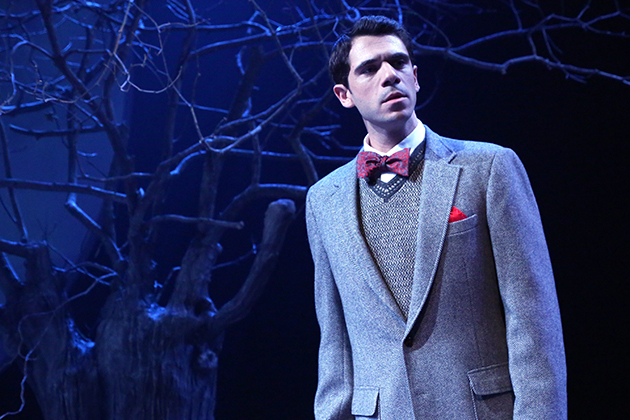
The age-old theme of suppressing the opposition is explored in playwright Michael Bradford’s new play “Olives and Blood,” which highlights the life and controversial death of Spanish writer Federico Garcia Lorca.
The play, the first in the Connecticut Repertory Theatre’s 2014-2015 season, runs from Oct. 2 to Oct. 12 at the Nafe Katter Theatre.
Lorca was an internationally renowned iconic member of the Generation of ’27 in Spain, a group of poets who advocated working with avant-garde forms of art and poetry. He expanded his writing to plays, and worked with the surrealist painter Salvador Dali. After becoming a critic of the Nationalist factions led by General Francisco Franco, he was executed in 1936 during the Spanish Civil War, reportedly at the hand of the Nationalists. His remains were never found.
Bradford, an associate professor of dramatic arts in the School of Fine Arts, says the unresolved questions surrounding Lorca’s death; the issue of artistic repression during a political upheaval; and the continuing power of a poetic voice provided many choices in writing the play.
“I think theater is not concerned with reality; theater is concerned with telling the truth,” he says. “Even if we know everything about a particular historical moment, it’s still right for the theater, for the artistic conversation. I teach theater history. I love Aristotle’s adage that basically the poet is more necessary to the community than the historian. I feel it is our job to take apart what we think we know and put those separate pieces on the stage and play with them to have a larger conversation about what we know. This was certainly easier because so little is known [about Lorca] and it’s been mythologized.”
The idea that power always wants to silence a voice that is disparate has another narrative; they get the opposite of what they want. They kill the person, but the voice explodes into the universe.
— Michael Bradford
Bradford says he tries in his writing to think about the larger universal context within which a play is happening. In “Olives and Blood,” the effort to silence an opposing voice represents a recurring theme throughout history.

“The idea that power always wants to silence a voice that is disparate, has another narrative; they get the opposite of what they want. They kill the person, but the voice explodes into the universe,” he says. “You’d think by now people in positions of power would know that, but they continue to do the same thing. It’s nice to know that power hasn’t gotten any smarter.”
Bradford had mostly pursued an African American focus in his writing until he was teaching about Lorca in class.
“I brought one of his plays into class to break it down, and fell in love with the poetic nature of his writing,” he says. “I began to research his life and was absolutely fascinated. I decided I wanted to try and write about him and figure out how to tackle him as an artist.”
Writing the play provided Bradford with the opportunity to incorporate some of Lorca’s powerful words into the script. He includes rehearsals for some of Lorca’s plays, and poetry from the collection of the writer’s prose and poetry, “In Search of Duende,” which was edited by Lorca scholar Christopher Mauer, a professor of Spanish at Boston University. Mauer will attend one of the post-production talkbacks of “Olives and Blood.”
“If you know [Lorca], you get a little bit of his background [from the play],” Bradford says. “If you don’t know anything, hopefully you leave with an appreciation of how he thought about his work and why we still know him and what was so important about it.”

The time Bradford spent exploring Lorca’s world has also influenced some of his upcoming projects – another play based on Lorca’s time in Cuba, and a new class focusing on Lorca and two other noted Spanish playwrights, Lope DeVega and Pedro Calderone LaBarca.
The CRT production of “Olives and Blood,” which is directed by Gary English, Board of Trustees Distinguished Professor of Theatre, is a contrast with the debut of the play in London last year, owing to different directorial visions and casting. Bradford says he enjoys seeing how his works are presented.
“I love the theater because I put this thing together in my room, and when my writing comes into the world, it looks different every time,” he says. “I am personally enthused by that. I wouldn’t want to direct my own work because it lives in another way with all these artists that attach themselves to it … I love the process almost as much as I love the product.”
For more information on the CRT production of “Olives and Blood” and for tickets, go to the CRT website.



